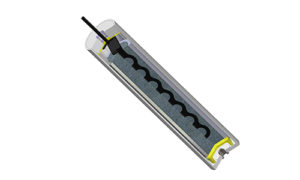High voltages and high currents circulating in EVs make the fundamentals of electrical isolation techniques an important topic. Ross Sabolcik, Silicon Labs AS automotive designs move toward electrification, high-wattage power electronics become critical to new electronic drivetrain and battery systems. In these applications, digital controllers safely interface with the high-voltage systems of modern electric vehicles […]
Here’s what happens when lithium-ion batteries are drastically overcharged
Lithium batteries have a high energy density so they can store a lot of energy in a small volume. But they can go up in smoke when bad things happen. Recently we recorded a short video to show what can happen during one of those bad things – overcharging. Excessive charging can bring on thermal […]
Why new battery technology will lead to disruptive medtech innovations
What’s the next big disruption in battery technology? Three experts from Integer, a global leader in medical device outsourcing, weigh in. Martin Cholette, Robert Rubino and Chris Williams, Integer What new technologies in medtech are being enabled by advances in battery technology? Chris Williams: One new technology is the leadless cardiac pacing market. Integer has developed…
- < Previous
- 1
- …
- 10
- 11
- 12



